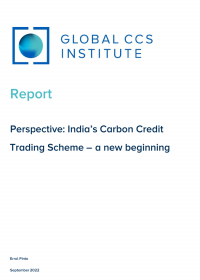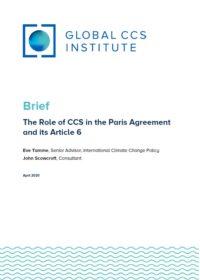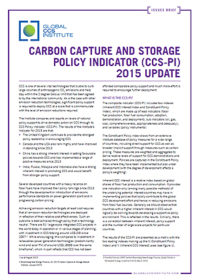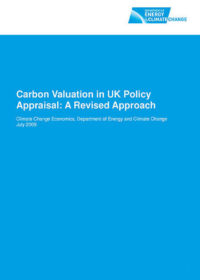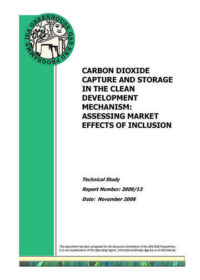Resources
Publications
Our publications, reports and research library hosts over 500 specialist reports and research papers on all topics associated with CCS.
View our Publication Library Disclaimer.
Filter by
India’s Carbon Credit Trading Scheme – a New Beginning
13th September 2022
Topic(s): Carbon markets, India
In August 2022, the Lower House of India's Parliament passed a bill to establish a domestic carbon credit trading scheme. The passing of the bill highlights the Government's focus on creating a climate mitigation framework that builds on the most flexible elements of international developments to meet its climate targets.
Although CCS is being evaluated in India, there is no timeline providing clarity about when CCS may be included in India's climate plans. However, the amendment indicates a new era for India in its quest to reduce emissions and meet climate commitments. Like carbon trading systems elsewhere, CCS projects may later be included and benefit from an Indian carbon market.
Disclaimer
The content within the Global CCS Institute Publications, Reports and Research Library is provided for information purposes only. We make every effort and take reasonable care to keep the content of this section up-to-date and error-free. However, we make no claim as to its accuracy, currency or reliability.
Content and material featured within this section of our website includes reports and research published by third parties. The content and material may include opinions and recommendations of third parties that do not reflect those held by the Global CCS Institute.
The Role of CCS in the Paris Agreement and its Article 6
29th April 2020
Organisation(s): Global CCS Institute
Topic(s): Carbon capture and storage (CCS), Carbon markets, Carbon removal, Policy law and regulation
There has been a growing interest within the Institute’s membership – and elsewhere – in the opportunities to drive the deployment of CCS by the provisions of Article 6 of the Paris Agreement. This paper draws together all the latest information and thinking on the Article and its role in enabling countries to meet the objectives they have set themselves in their Nationally Determined Contributions (NDCs), with particular emphasis on how it can impact CCS.
The paper, authored by our Senior Policy Advisor Eve Tamme and Consultant John Scowcroft, provides insights into the history of Article 6, elaborates on how it can be an enabler for CCS, and looks into the upcoming developments in this field by answering the following questions:
• What does Article 6 do?
• What does Article 6 not do?
• Where is Article 6 in the international climate negotiations?
• What does Article 6 mean for CCS?
• What are the next steps?
Disclaimer
The content within the Global CCS Institute Publications, Reports and Research Library is provided for information purposes only. We make every effort and take reasonable care to keep the content of this section up-to-date and error-free. However, we make no claim as to its accuracy, currency or reliability.
Content and material featured within this section of our website includes reports and research published by third parties. The content and material may include opinions and recommendations of third parties that do not reflect those held by the Global CCS Institute.
Carbon Capture and Storage Policy Indicator (CCS-PI): 2015 update
2nd September 2015
Topic(s): Carbon capture use and storage (CCUS), Carbon markets, Domestic policy, Economics, Policy law and regulation
The Institute has developed an analytical framework to derive a composite indicator that compares levels of national policy support to drive domestic action on CCS.
This 2015 update of the CCS Policy Indicator includes some important developments that have occurred in several major countries since it was last published in 2013.
Disclaimer
The content within the Global CCS Institute Publications, Reports and Research Library is provided for information purposes only. We make every effort and take reasonable care to keep the content of this section up-to-date and error-free. However, we make no claim as to its accuracy, currency or reliability.
Content and material featured within this section of our website includes reports and research published by third parties. The content and material may include opinions and recommendations of third parties that do not reflect those held by the Global CCS Institute.
Position paper on benchmarking and allocation rules in phase III of the EU Emissions Trading System
1st February 2010
Topic(s): Carbon markets, Policy law and regulation
Disclaimer
The content within the Global CCS Institute Publications, Reports and Research Library is provided for information purposes only. We make every effort and take reasonable care to keep the content of this section up-to-date and error-free. However, we make no claim as to its accuracy, currency or reliability.
Content and material featured within this section of our website includes reports and research published by third parties. The content and material may include opinions and recommendations of third parties that do not reflect those held by the Global CCS Institute.
Carbon valuation in UK policy appraisal: a revised approach
1st July 2009
Topic(s): Carbon markets, Economics, Social cost
Disclaimer
The content within the Global CCS Institute Publications, Reports and Research Library is provided for information purposes only. We make every effort and take reasonable care to keep the content of this section up-to-date and error-free. However, we make no claim as to its accuracy, currency or reliability.
Content and material featured within this section of our website includes reports and research published by third parties. The content and material may include opinions and recommendations of third parties that do not reflect those held by the Global CCS Institute.
Carbon dioxide capture and storage in the clean development mechanism: assessing market effects of inclusion
13th November 2008
Topic(s): Carbon capture use and storage (CCUS), Carbon markets, Policy law and regulation
The report presents findings associated with the possible inclusion of carbon dioxide capture and geological storage (CCS) within the Kyoto Protocol’s clean development mechanism (CDM), and the potential repercussions this could have on the global regulated carbon market.
In order to achieve this, it examines the effects of creating additional certified emission reduction (CER) 'offsets' from CCS activities to the pool available for compliance by Annex B Parties to the Kyoto Protocol. The study also considers implications for 2020 in order to gauge potential market effects of CCS in any future, yet-to-be-agreed, post-2012 international carbon trading mechanism.
Disclaimer
The content within the Global CCS Institute Publications, Reports and Research Library is provided for information purposes only. We make every effort and take reasonable care to keep the content of this section up-to-date and error-free. However, we make no claim as to its accuracy, currency or reliability.
Content and material featured within this section of our website includes reports and research published by third parties. The content and material may include opinions and recommendations of third parties that do not reflect those held by the Global CCS Institute.
